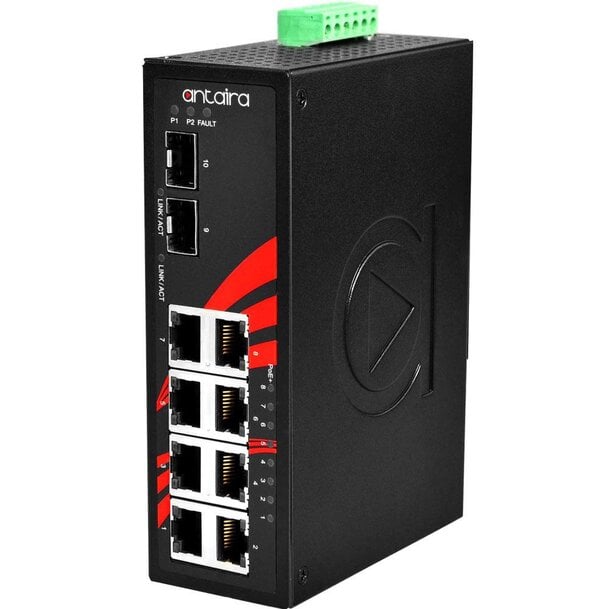Conformal Coatings Shield Industrial Network Devices from Corrosion
Antaira Technologies applies ISO- and ISA-compliant coatings to protect Ethernet switches and wireless devices against chemicals, heat, and harsh environments.
www.antaira.com

Industrial facilities regularly process an assortment of highly corrosive chemicals and materials, all of which will degrade the structural integrity of plant machinery. According to NACE International, the U.S. production and manufacturing sector suffers an estimated $17 billion in corrosion-related damage annually as a result of these chemicals, as well as high temperatures, humidity, dust, and pollution.
Corrosion deteriorates all forms of industrial equipment. Its dangers extend beyond typical machinery, such as pumps, motors or compressors, to networking devices that collecting and analyzing data from industrial operations.
Choosing Ethernet switches, wireless devices, and other networking solutions shielded by conformal coatings is one of the main strategies used by plant managers to stop corrosion from compromising OT and IT networks. Here’s how conformal coatings get the job done in the face of challenging workplace conditions.
What Are Conformal Coatings?
Conformal coatings are non-conductive polymeric films that overlay network components, like printed circuit boards and electronic assemblies, improving their durability by shielding them from contaminants and mechanical stresses.
Usually up to 200 micrometers thick, a polymeric film is a thin, continuous layer of polymeric plastic. Polymers are long, repeating chains of molecules found in most plastics we know and use today. Depending on the molecular properties and thicknesses of the polymer, they can make everything from flimsy grocery bags to solid water bottle caps. Conformal coatings harness the contiguous, sheet-like, impenetrable property of these films for technological casings.
Not all polymeric films are the same. The main types of plastic coatings include acrylic resin, polyurethane resin, epoxy resin, silicone resin, and parylene. Each type has slightly different properties that qualify them for various applications. For example, epoxy resin is well suited for harsh environments, while acrylic resin has low resistance to chemicals. Depending on the device and application, manufacturers will use different conformal coating types that fit the bill.
There are several ways to apply conformal coatings on wires and PCB assemblies. Three of the most common include brushing, dipping, and spraying. Each comes with benefits and relative ease of adhering.
End-to-End Sealing
So how do conformal coatings—a mere micrometers-thick plastic film—keep harmful materials and environmental pressures at bay? The key is an end-to-end sealing effect. When a conformal coating is applied, it seals off the PCB, cable, or other electrical equipment from the outside world. This seal essentially creates an impermeable bubble containing a microscopic vacuum encasing the device. The protective membrane prevents the device from the ingress of dust, debris, water, salt, and chemicals. The hydrophobic nature repels liquids from the surface altogether.
Many types of conformal coatings offer excellent heat resistance, depending on the chemical composition. These coatings are vital for applications in harsh, high-temperature environments like industrial manufacturing. Silicone, for example, has low thermal conductivity so it takes longer for heat to travel through its particles. Silicone’s high structural stability makes it harder for heat to break its molecular bonds, thereby keeping dangerously high heat away from electronics.
Antaira Conformal Coated Products
Antaira applies conformal coatings to many of its industrial networking equipment in accordance with strict environmental specifications, including ISO 9223 C5/CX and ISA 71.04 G3/GX. To ensure its products will thrive in every industrial situation, Antaira also complies with the International Organization for Standardization and International Society for Automation standards for extreme corrosion and air contaminant resistance in toxic environments.
Article by Henry Martel, Field Application Engineer, Antaira Technologies
www.antaira.com

